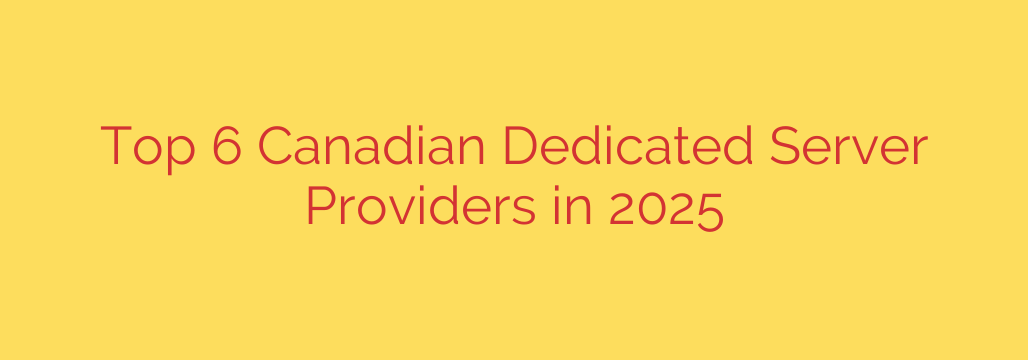
The Ultimate Guide to Choosing a Canadian Dedicated Server in 2025
For businesses requiring uncompromising performance, security, and control, a dedicated server is the gold standard. When your operations target a North American audience, choosing a Canadian dedicated server offers a distinct strategic advantage. This guide will explore the critical benefits of hosting in Canada and outline the key factors you must consider to select the right provider for your needs in 2025.
Why Choose a Canadian Dedicated Server?
Opting for a server physically located in Canada is about more than just geography. It’s a decision that impacts data privacy, performance, and regulatory compliance.
- Data Sovereignty and Privacy: Canada has robust privacy laws, most notably the Personal Information Protection and Electronic Documents Act (PIPEDA). Hosting your data within Canadian borders ensures it is protected by these regulations, providing peace of mind for you and your clients. This is a crucial factor for businesses in sectors like healthcare, finance, and legal services.
- Superior Performance and Low Latency: For users located in Canada and the northern United States, a Canadian server provides significantly lower latency. Physical proximity to your user base means faster load times, a better user experience, and improved SEO rankings. Data simply travels a shorter distance, resulting in quicker response times for websites and applications.
- Robust and Stable Infrastructure: Canada boasts a secure political climate and a world-class technology infrastructure. Its data centers are powered by reliable energy grids and connected via high-speed, redundant networks, ensuring maximum uptime and stability for your critical operations.
Key Factors to Consider When Selecting a Provider
Not all dedicated server providers are created equal. To make an informed decision, evaluate potential hosts based on the following criteria.
1. Hardware and Performance
The core of your server is its hardware. Look for providers that offer modern, high-performance components.
- CPU: Ensure access to the latest generations of processors from Intel (Xeon) or AMD (EPYC) for powerful and efficient computing.
- RAM: The amount of RAM directly affects how many processes your server can handle simultaneously. 16GB is a minimum for most applications, with 32GB or more recommended for demanding workloads.
- Storage: NVMe SSDs offer the fastest possible read/write speeds, dramatically improving database performance and application loading times compared to traditional SSDs or HDDs.
2. Network Quality and Uptime Guarantee
A powerful server is useless if it’s frequently offline.
- Service Level Agreement (SLA): A strong SLA is non-negotiable. Look for providers that guarantee at least 99.9% uptime. This commitment ensures you will be compensated if they fail to meet this standard.
- Bandwidth and Port Speed: Check the included bandwidth allocation and the server’s port speed (e.g., 1 Gbps or 10 Gbps). Generous or unmetered bandwidth is essential for high-traffic sites to avoid overage fees.
- DDoS Protection: Distributed Denial of Service (DDoS) attacks can cripple your server. Comprehensive, always-on DDoS mitigation is a critical security feature that top-tier providers include standard.
3. Security and Compliance
Beyond DDoS protection, your provider should offer a suite of security features to safeguard your data.
- Firewalls: Customizable hardware or software firewalls are essential for controlling traffic to and from your server.
- Server Monitoring: Proactive 24/7 monitoring helps detect and resolve issues before they cause downtime.
- Compliance Certifications: If you operate in a regulated industry, ensure the data center holds relevant certifications like SOC 2 or ISO 27001.
4. Customer Support and Management Options
Your relationship with a provider is defined by its support.
- 24/7/365 Availability: Technical issues can arise at any time. Insist on a provider that offers round-the-clock support through multiple channels like phone, live chat, and a ticketing system.
- Managed vs. Unmanaged: Decide what level of control you need. Unmanaged servers give you full root access and responsibility, while managed services handle server maintenance, updates, and security, allowing you to focus on your business.
Essential Security Tips for Your Dedicated Server
Once you have chosen a provider, securing your server is your responsibility. Implement these best practices immediately:
- Regularly Update Software: Keep your operating system, control panel, and all applications patched and up-to-date to protect against known vulnerabilities.
- Configure a Strong Firewall: Restrict access to essential ports only. By default, block all traffic and explicitly allow what is necessary for your applications to function.
- Use SSH Keys for Access: Disable password-based root login and use SSH keys instead. This is a significantly more secure method of authentication.
- Implement a Backup Strategy: Schedule regular, automated backups and store them in a secure, off-site location. Test your backup restoration process periodically to ensure it works.
- Monitor Logs: Regularly review server access and error logs to identify suspicious activity or potential security threats early.
Making the Right Choice
Selecting the best Canadian dedicated server provider is a critical investment in your digital infrastructure. By prioritizing providers that offer modern hardware, a resilient network with robust DDoS protection, and responsive 24/7 support, you can build a secure and high-performance foundation for your business. Focus on your specific needs—whether they are raw computing power, strict data compliance, or hands-on managed support—to find a partner that will help you succeed now and in the future.
Source: https://www.redswitches.com/blog/best-dedicated-server-providers-in-canada/








